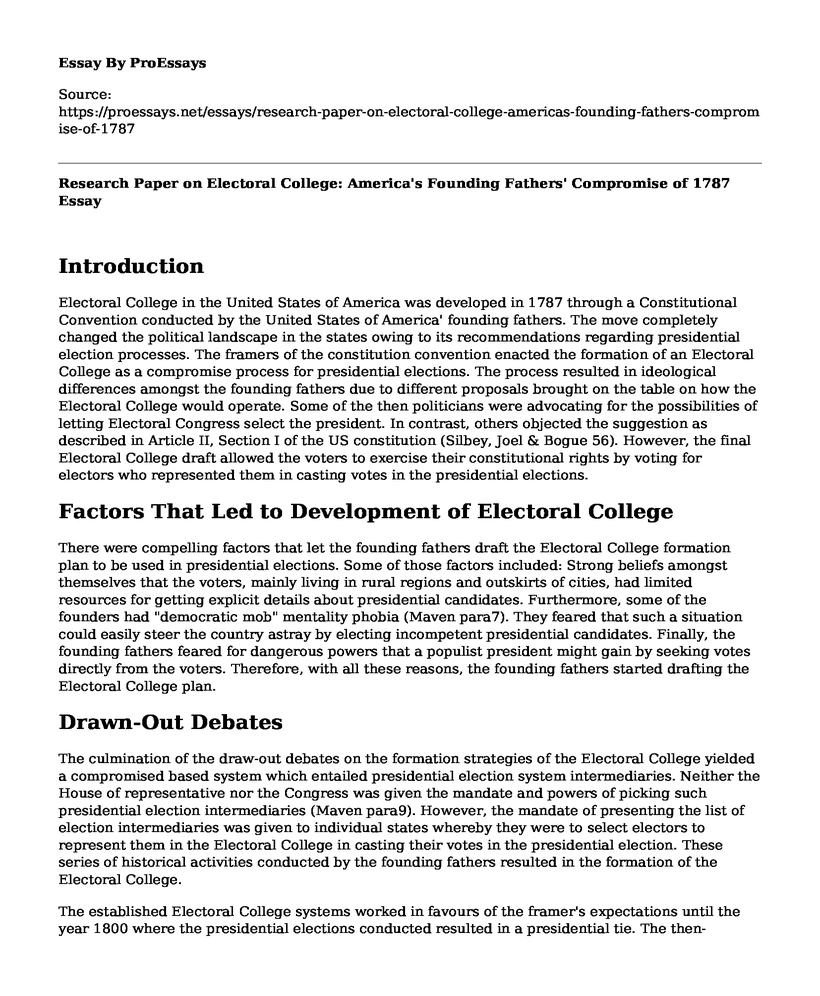Introduction
Electoral College in the United States of America was developed in 1787 through a Constitutional Convention conducted by the United States of America' founding fathers. The move completely changed the political landscape in the states owing to its recommendations regarding presidential election processes. The framers of the constitution convention enacted the formation of an Electoral College as a compromise process for presidential elections. The process resulted in ideological differences amongst the founding fathers due to different proposals brought on the table on how the Electoral College would operate. Some of the then politicians were advocating for the possibilities of letting Electoral Congress select the president. In contrast, others objected the suggestion as described in Article II, Section I of the US constitution (Silbey, Joel & Bogue 56). However, the final Electoral College draft allowed the voters to exercise their constitutional rights by voting for electors who represented them in casting votes in the presidential elections.
Factors That Led to Development of Electoral College
There were compelling factors that let the founding fathers draft the Electoral College formation plan to be used in presidential elections. Some of those factors included: Strong beliefs amongst themselves that the voters, mainly living in rural regions and outskirts of cities, had limited resources for getting explicit details about presidential candidates. Furthermore, some of the founders had "democratic mob" mentality phobia (Maven para7). They feared that such a situation could easily steer the country astray by electing incompetent presidential candidates. Finally, the founding fathers feared for dangerous powers that a populist president might gain by seeking votes directly from the voters. Therefore, with all these reasons, the founding fathers started drafting the Electoral College plan.
Drawn-Out Debates
The culmination of the draw-out debates on the formation strategies of the Electoral College yielded a compromised based system which entailed presidential election system intermediaries. Neither the House of representative nor the Congress was given the mandate and powers of picking such presidential election intermediaries (Maven para9). However, the mandate of presenting the list of election intermediaries was given to individual states whereby they were to select electors to represent them in the Electoral College in casting their votes in the presidential election. These series of historical activities conducted by the founding fathers resulted in the formation of the Electoral College.
The established Electoral College systems worked in favours of the framer's expectations until the year 1800 where the presidential elections conducted resulted in a presidential tie. The then-presidential candidates were Thomas Jefferson and Aaron Burr hence disapproving the founding fathers' expectations on the efficiency of the developed presidential system. This historical incidence resulted in a constitutional amendment in which the presidential voting system was spelt in a more detailed manner to avoid Electoral College-related complications in future (Newingham 34). House of Representatives came in to harmonize the Electoral College fault through breaking the presidential tie that occurred due to electors' presidential votes cast being equal.
Conclusion
The founding fathers' journey of developing the Electoral College entailed a series of debates, ideological differences amongst the framers, approaches of combating challenges that arose and finally the process culminated in the formation of Electoral College in the constitutional Convention of 1787. Therefore the founding fathers achieved that goal and drafted the Electoral College under Article II, Section I of the United States of America' constitution.
Works Cited
Maven A. Channel C. "Why Was the Electoral College Created?" The Founding Fathers had to compromise when it came to devising a system to elect the president, 7 Jan. 2020, www.history.com/news/electoral-college-founding-fathers-constitutional-convention. Accessed 1 Feb. 2020.
Newingham, Madison. "Creating an Oligarchy: An Intellectual History of the Electoral College." (2019).
Silbey, Joel H., and Allan G. Bogue, eds. The history of American electoral behaviour. Princeton University Press, 2015.
Cite this page
Research Paper on Electoral College: America's Founding Fathers' Compromise of 1787. (2023, Mar 28). Retrieved from https://proessays.net/essays/research-paper-on-electoral-college-americas-founding-fathers-compromise-of-1787
If you are the original author of this essay and no longer wish to have it published on the ProEssays website, please click below to request its removal:
- Essay on Online Learning Effects on the Learning Processes
- Why Children Should be Given Less Homework Essay
- Personal Statement: Msc Remote Sensing and GIS
- Essay Sample on Leadership, Critical Thinking and Intellectual Courage
- Essay Example on Medical University Improves Life Expectancy of Rural Areas
- Application Essay for Scholarship to Study Engineering Management
- Historical Analysis of English Learning: Rooting & Development - Essay Sample







